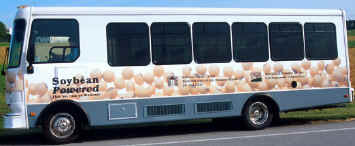Biodiesel
FAQs about Biodiesel
What is biodiesel?
Biodiesel is an alternative fuel, produced from either virgin vegetable oils (such as soy, canola) or from waste greases or other renewable resources. Biodiesel contains no petroleum, but it can be blended with petroleum diesel to create a biodiesel blend. Although 100% biodiesel can be used directly as a fuel, it is most often blended with conventional diesel fuel up to the 20% level, to minimize potential concerns with filter plugging, hose and seal degradation, cold weather flow properties, and engine modification requirements. Typically, biodiesel blends, ranging from 5% biodiesel with 95% diesel up to 20% biodiesel with 80% diesel, are being used in the Northeastern U.S. in compression-ignition (diesel) engines and for home heating.
Read more about biodiesel in the P2 View Newsletter, Fall 2005, page 5.
How is biodiesel made?
The oils and fats are filtered and preprocessed to remove water and contaminants. The pretreated oils and fats are then mixed with an alcohol (usually methanol, sometimes ethanol) and a catalyst (usually sodium or potassium hydroxide). This chemical process is called transesterification and results in the glycerin being separated from the fat or vegetable oil. The process leaves behind two products -- methyl esters (the chemical name for biodiesel) and glycerin (a valuable by-product usually sold to be used in soaps and other products).
Prior to use as a fuel, it is important that the finished biodiesel be analyzed to ensure it meets ASTM specifications (ASTM D6751-03a). The ASTM standard is designed to ensure full product reaction and adequate removal of glycerin, catalyst, alcohol, and the absence of any free fatty acids. This standard covers pure biodiesel (B100 or "neat" biodiesel), for blending with petroleum diesel in levels up to 20% by volume. In addition, biodiesel products must be registered with the USEPA under 40CFR Part 79.
The 20% blend level is also required for the fuel to be recognized as an "alternative fuel" under the federal Environmental Policy Act. Biodiesel is slightly heavier than petroleum diesel. Therefore, it is typically splash blended on top of petroleum diesel to ensure proper mixing.
Where is biodiesel being made, what is the potential for the industry and how should it be handled?
Biodiesel is being made throughout the United States. The National Biodiesel Board site has information on production.
Biodiesel Handling and Use Guidelines, 2006
Report by the US Department of Energy with information for fleet operators on handling and use of biodiesel including issues dealing with cold flow properties, stability, microbial growth, safety and more.
The US Department of Energy maintains an Alternative Fuels Center. This is an excellent resource that includes information on Connecticut Laws and Incentives.
2007 Connecticut Biodiesel Legislation - June 2007 Special Session
PA 07-04, Sections 51-59 (pdf), Financial incentives for biodiesel producers and distributors.
UPDATE: There are no incentives currently available in CT.
Biodiesel As A Transportation Fuel
Biodiesel and biodiesel blends are being used to operate diesel engines throughout New England and other parts of the country. Certain fleets, bus operators and individuals have begun to utilize biodiesel.
- US DOE’s Clean Cities program has information on biodiesel in transportation related applications.
- EPA report on Comprehensive Analysis of Biodiesel Impacts on Exhaust Emission
Other biodiesel sites
These websites are provided for information only. DEEP does not endorse any products or services.
- The Veggie Van Organization is nonprofit educational service that promotes biodiesel fuel and other renewable energies through hands-on demonstrations, school presentations and road tours.
- American Greenfuels - located at New Haven Terminal
Facility permit information - Robert Hannon, Program Planning & Development, 860-424-3245
General information - Bureau of Energy Policy & Technology, (860) 827-2655
Regulatory questions - Ross Bunnell, Materials Management & Compliance Assistance, 860-424-3274
Air Issues - Paul Kritzler, Toxics and Mobil Source, 860-424-3441
Content Last Updated January 2020


